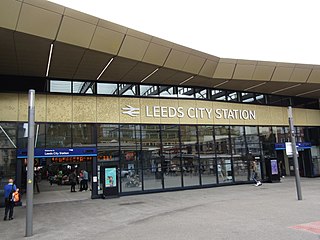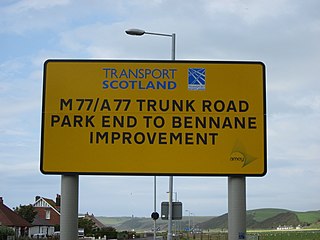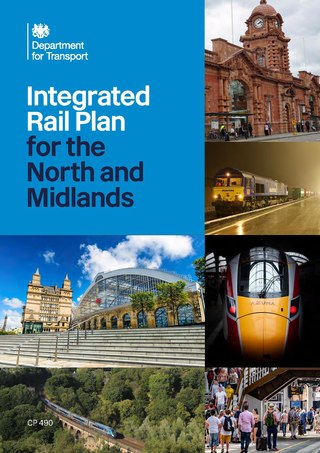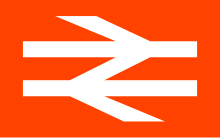
The railway system in Great Britain is the oldest railway system in the world. The first locomotive-hauled public railway opened in 1825, which was followed by an era of rapid expansion. Most of the track is managed by Network Rail, which in 2017 had a network of 9,824 miles (15,811 km) of standard-gauge lines, of which 3,339 miles (5,374 km) were electrified. In addition, some cities have separate metro, light rail and tram systems, among them the historic London Underground and the Glasgow Subway. There are also many private railways, some of them narrow-gauge, which are primarily short lines for tourists. The main rail network is connected with that of continental Europe by the Channel Tunnel and High Speed 1, opened in 1994 and 2007 respectively.
British Railways (BR), which from 1965 traded as British Rail, was a state-owned company that operated most rail transport in Great Britain from 1948 to 1997. Originally a trading brand of the Railway Executive of the British Transport Commission, it became an independent statutory corporation in January 1963, when it was formally renamed the British Railways Board.
National Rail (NR) is the trading name licensed for use by the Rail Delivery Group, an unincorporated association whose membership consists of the passenger train operating companies (TOCs) of England, Scotland, and Wales. The TOCs run the passenger services previously provided by the British Railways Board, from 1965 using the brand name British Rail. Northern Ireland, which is bordered by the Republic of Ireland, has a different system. National Rail services share a ticketing structure and inter-availability that generally do not extend to services which were not part of British Rail.

Transport in the United Kingdom is highly facilitated by road, rail, air and water networks. Transport is a devolved matter with each of the countries of the United Kingdom having separate systems under separate governments.

Network Rail Limited is the owner and infrastructure manager of most of the railway network in Great Britain. Network Rail is a non-departmental public body of the Department for Transport with no shareholders, which reinvests its income in the railways.

Leeds railway station is the mainline railway station serving the city centre of Leeds in West Yorkshire, England. It is located on New Station Street to the south of City Square, at the foot of Park Row, behind the landmark Queens Hotel. It is one of 20 stations managed by Network Rail. As of December 2023, it was the busiest station in West Yorkshire, as well as in Yorkshire & the Humber, and the entirety of Northern England. It is the second busiest station in the UK outside of London, after Birmingham New Street.
The privatisation of British Rail was the process by which ownership and operation of the railways of Great Britain passed from government control into private hands. Begun in 1994, the process was largely completed by 1997. The deregulation of the industry was in part motivated by the enactment of EU Directive 91/440 in 1991, which aimed to create a more efficient railway network by creating greater competition.

Rail transport in Wales began in the early 19th century initially used for industrial purposes and shortly began to be used for commercial purposes. The Beeching cuts had a significant impact on rail transport in Wales, closing a large number of railway stations. Since then some stations have reopened in Wales and following Welsh devolution, the Wales and Borders passenger rail franchise was established in 2001 and the operator was taken into public ownership by the Welsh Government in 2021.
A train operating company (TOC) is the term used on the railway system of Great Britain for a railway undertaking operating passenger trains under the collective National Rail brand. TOCs have existed since the privatisation of the network under the Railways Act 1993.

Rail Alphabet is a neo-grotesque sans-serif typeface designed by Jock Kinneir and Margaret Calvert for signage on the British Rail network. First used at Liverpool Street station, it was then adopted by the Design Research Unit (DRU) as part of their comprehensive 1965 rebranding of the company. It was later used by other public bodies in the United Kingdom.

England has a dense, multimodal transportation infrastructure. The Department for Transport is the government department responsible for the transport network in England. The Secretary of State for Transport is the member of the cabinet responsible to Parliament for the Department for Transport.

The transport system in Scotland is generally well-developed. The Scottish Government and Scottish Parliament has control over most elements of transport policy within Scotland, with the Cabinet Secretary for Transport, Net Zero and Just Transition holding portfolio responsibility within the Scottish Government. Transport Scotland is the Executive Agency responsible for the Scottish transport network.

The period from 1995 covers the history of rail transport in Great Britain following the privatisation of British Rail. During this period, passenger volumes have grown rapidly, safety has improved, and subsidies per journey have fallen. However, there is debate as to whether this is due to privatisation or to better government regulation. During this period, High Speed 1, the West Coast Main Line upgrade and Crossrail were completed and more construction projects are currently under way. The period also saw the demise of privately-owned Railtrack and its replacement with government-owned Network Rail.

Passenger rail franchising in Great Britain is the system of contracting the operation of the passenger services on the railways of Great Britain to private companies, which has been in effect since 1996 and was greatly altered in 2020, with rail franchising being effectively abolished in May 2021.

ScotRail has been the brand name used for all Scottish regional and commuter rail services, including some cross-border services, since September 1983, as well as many of the country's intercity services.

Arriva Rail North, branded as Northern by Arriva, was a train operating company in Northern England which began operating the Northern franchise on 1 April 2016 and inherited units from the previous operator Northern Rail. A subsidiary of Arriva UK Trains, Northern was the largest train franchise in the United Kingdom in terms of the size of the network and the number of weekly services run. Its trains called at 528 stations, about a quarter of all stations in the country; of these stations 476 were operated by Northern. On 1 March 2020, Arriva Rail North Limited ceased to operate and all operations were handed to HM Government's Operator of Last Resort.

The impact of the privatisation of British Rail has been the subject of much debate, with the stated benefits including improved customer service, and more investment; and stated drawbacks including higher fares, lower punctuality and increased rail subsidies. The privatisation of British Rail began in the 1990s.

Northern Trains, trading as Northern, is a British train operating company owned by DfT OLR Holdings for the Department for Transport (DfT), after the previous operator Arriva Rail North had its franchise terminated at the end of February 2020.

The Integrated Rail Plan for the North and Midlands or more simply, the Integrated Rail Plan (IRP), is a United Kingdom government proposal published on 18 November 2021. It aims to deliver "increased capacity, faster journeys or more frequent services on eight out of the top ten busiest rail corridors across the North and Midlands", by developing rail services along with the required infrastructure in these regions of England. It was published by the Department for Transport (DfT) and features forewords by Prime Minister Boris Johnson and Transport Secretary Grant Shapps, but its publication was delayed a number of times, partly because of the COVID-19 pandemic. It contains the significant proviso that "In line with the Government's existing approach to rail enhancements, commitments will be made only to progress individual schemes up to the next stage of development, subject to a review of their readiness." A Technical Annexe was published in January 2022. A correction slip was issued March 2022.
The 2022–2024 United Kingdom railway strikes are an industrial dispute in the United Kingdom between rail workers and companies, with the latter supported by the UK government. The rail workers are represented by several unions including the National Union of Rail, Maritime and Transport Workers (RMT) and the Associated Society of Locomotive Engineers and Firemen (ASLEF). The railway strikes commenced on 21 June 2022 after workers walked out over wages, planned changes to working practices – involving the removal of guards from trains, the reduction in the number of open ticket offices, and an increase in the age at which people could claim the young persons and senior citizen card – and the threat of redundancies. The industrial action was the largest in the sector since 1989, and involved 40,000 workers nationwide.
















